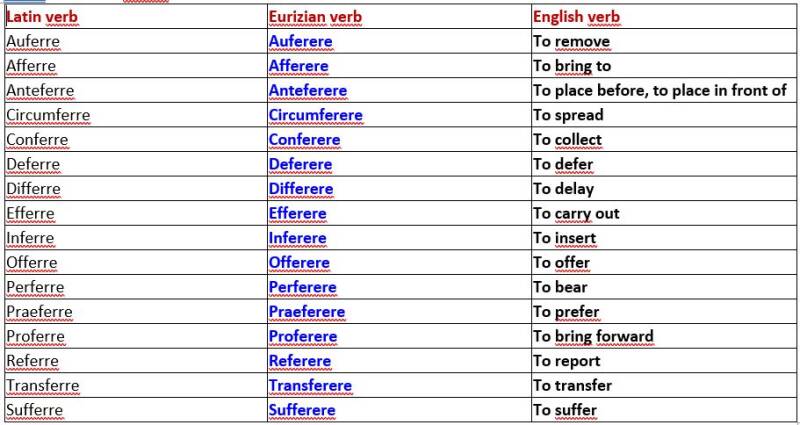VERBS DERIVATION RULES
Rules of derivation from Latin verbs
Latin verbs that in the infinitive mode end in -RE also retain the exact same form in Euritian verbs in infinitive mode. Latin verbs that do not end in -RE in the infinitive mode are modified to obtain the Eurizian verbs according to the following rules.
- The latin verb Esse changes the infinitive form to Essére.
- Compound verbs of the verb Esse add the ending -RE to the infinitive form according to the following scheme:

- For deponent verbs:
⮚ verbs in -ari change the infinitive to -are (e.g.: Latin hortari becomes hortàre);
⮚ verbs in -eri change the infinitive into -ere (e.g.: Latin vereri becomes verère);
⮚ verbs in -i change the infinitive to -ere (e.g.: Latin sequi becomes sequère);
⮚ verbs in -iri change the infinitive into -ire (e.g.: Latin largiri becomes largìre);
- Verb Ferre (to bring) changes the infinitive to Ferére. The variation also applies to all compounds verbs of Ferre

- The verb Velle (to want) becomes volére;
- The verb Nolle (not to want) becomes nolére;
- The verb Malle (to prefer) becomes mallére;
- The verb fieri (to become) becomes fiére;
- The verb Coepisse (to begin) becomes coepére;
- The verb Memini (to remember) becomes meminére;
- The verb Odi (to hate) becomes odére;
- The verb Aio (to say, to affirm) becomes aire;
- The verb Inquam (to say) becomes inquire ;
- The verb Fari (to speak with solemnity) becomes farére; in the same way the compound verbs of fari are transformed :
- Affari (to speak) becomes affarére;
- Effari (to pronounce) becomes effarére;
- Praefari ( to say before) becomes praefarére;
- Profari ( to predict) becomes profarére.
- The verb Videri (to seem) is replaced by visére.
- The Latin deponent verb Misereri (to have mercy on) becomes miserere and is conjugated in Eurizian as a regular verb. It should be noted that the Eurizian construction of the verb is transitive and always requires that the person or thing on whom mercy is shown be expressed as a direct object.
Rules of derivation from Esperanto verbs
In Eurizian, verbs in modern use that have no correspondence in Latin or that in Latin would be expressed with locutions comprising more than one word are derived from Esperanto. Since all Esperanto verbs in the infinitive mode end in -i, the rule for obtaining the Eurizian verb from the corresponding Esperanto verb in the infinitive is very simple: simply replace the termination in i with the termination in -ARE.
Example: to take off (said of an aircraft) in Esperanto is said ekflugi; to get the Eurian verb you remove the final i (ekflug-) and add -are, thus obtaining the infinitive ekflugare.